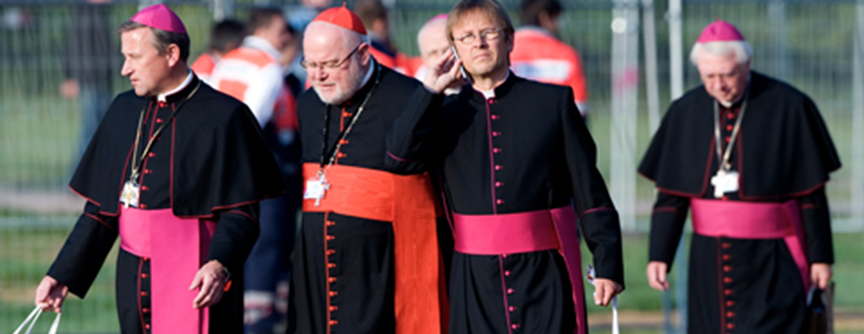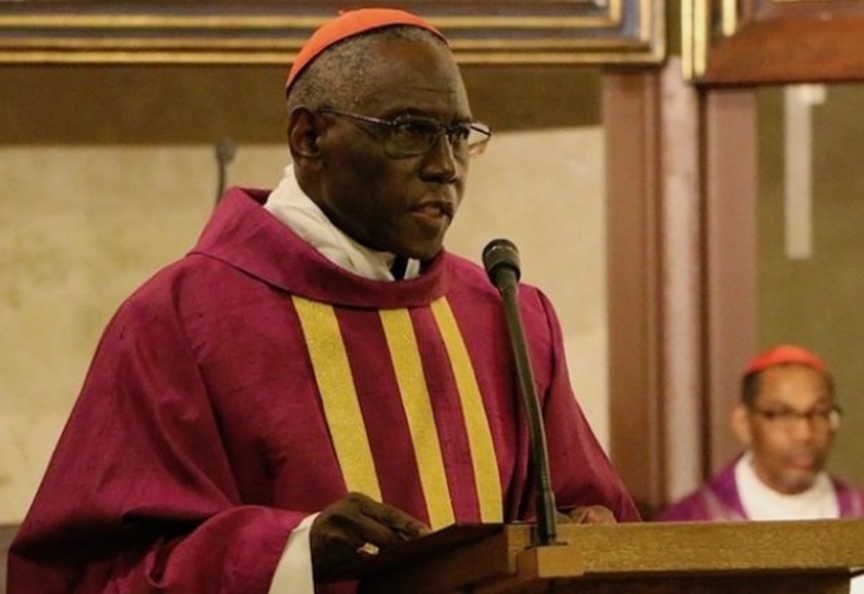 Why we should now consider
Why we should now consider
Germany as 'mission territory'
Senior German churchmen have made clear that they believe something
different than what’s in the Catechism of the Catholic Church
by George Weigel

February 28, 2018
In his June 1908 apostolic constitution,
Sapienti Consilio, Pope Pius X decreed that, as of November 3 that year, the Catholic Church in the United States would no longer be supervised by the Vatican’s missionary agency, the Congregation for the Propagation of the Faith (Propaganda Fide). American Catholicism had grown up. The U.S. Church would now be a mission-sending Church, not “mission territory.”
This pattern has long characterized the organization of the world Church. Young local Churches begin as “mission territory” and their bishops are chosen in consultation with what’s now called the “Congregation for the Evangelization of Peoples” (but which everyone in Rome still refers to by its old name, “Propaganda,” or simply “Prop”).
After these young Churches demonstrate that they can stand on their own spiritually, organizationally, and financially, they cease being “mission territory” and relate to the Roman Curia like the older local Churches; the bishops of these newly “graduated” local Churches are thus chosen in consultation with the Congregation for Bishops.
The rapid de-Christianization of Europe, however, prompts a thought-experiment:
- What should the Church do when this process of ecclesial maturation slips into reverse?
- Where do venerable but collapsing local Churches “fit” in their relationship to the Curia, the central government of the Catholic Church?
- If there can be a (sometimes lengthy) period of ecclesiastical apprenticeship during which a young, growing local Church is supervised by Propaganda Fide, might there be a parallel arrangement for decaying older local Churches, in which they’re taken into a form of ecclesiastical trusteeship aimed at rebuilding their evangelical, catechetical, and pastoral strength?
- And if we can imagine that (admittedly bold) move, which Roman agency should be the trustee?
For purposes of this thought-experiment, my nominee would be the Pontifical Council for Promoting the New Evangelization. It seems the logical place. John Paul II’s 1990 encyclical
Redemptoris Missio, the Magna Carta of the New Evangelization, called for
urgent evangelism among Christians who had fallen away from the practice of the faith, or who had been poorly catechized, or who had, more likely, suffered both maladies, the latter contributing to the former.
That seems to describe most of the Church in western Europe. So
perhaps the Church’s central administration should stop relating to dying European local Churches as if they weren’t dying, and recognize that they are, in fact, mission territory. But rather than putting such local Churches back under the supervision of “Prop,” put them into trusteeship under the supervision of a reconstituted and re-staffed Pontifical Council for the New Evangelization – just like a failed company that goes into Chapter 11 bankruptcy is supervised by a trustee until such time as the company can stand on its own feet again.
What would happen under this “trusteeship”? Again, let’s think outside the box.
[It's an intriguing set of propositions but whether they're even doable at all under the present papal dispensation is highly questionable.]
- The trustee agency would recommend to the Pope replacements for failed bishops and nominees for empty sees, drawing candidates from around the world who had demonstrated success in enlivening a sclerotic or corrupt local Church.
[How would one define a 'failed bishop' in this case, and would the pope, who alone can appoint bishops, agree with such a definition? Since all but a literal handful (you can count them on the fingers of one hand) of bishops in Germany promote and thrive on their apostate and heretical positions on Catholic doctrine and practice, then the latter must all be considered failed bishops, starting with Cardinal Marx who currently heads the German bishops' conference and is among the pope's advisers. How do you replace some 200 bishops in one fell swoop? And shouldn't they be the first objects of New Evangelization?]
- Pastoral life in the moribund local Church and the structures of its national bureaucracy would be examined by Catholics who are expert in making organization serve evangelization; those consulters would then make recommendations to the Pontifical Council for the New Evangelization for mandated reforms.
- There would be apostolic visitations of seminaries and houses of religious formation, led by seminary rectors and religious men and women from living and growing communities, who would recommend needed changes; the trustee agency would then mandate their implementation.
Where might this form of trusteeship be tested? How about Germany? The practice of the faith is dying there. Senior German churchmen have made clear that they believe something different than what’s in the Catechism of the Catholic Church, whether the issue is the nature of marriage, the ethics of human love, the character of the Holy Eucharist and the priesthood, the authority of revelation, or the enduring effects of baptism.
And what could be more appropriate on the quincentenary of the Reformation than to call German Catholicism to a thoroughgoing Catholic reform?
Perhaps this thought-experiment – putting the German Church into ecclesiastical trusteeship – isn’t the answer to the Church’s German problem.
But recognizing that Germany is mission territory is the beginning of any serious analysis of a grave situation, and any serious thinking about how it might be addressed.
Meanwhile, the intrepid Cardinal Sarah denounces the lack of faith on evident display by many bishops exemplified by those in Germany...
 Cardinal Sarah:
Cardinal Sarah:
'I denounce the lack of faith
in a betraying clergy'
by Marco Tosatti

February 27, 2018
In recent days, Cardinal Robert Sarah, Prefect of the Congregation for Divine Worship, was in Belgium for a presentation of his book,
God or Nothing. He responded to certain tendencies to modify Catholic morality, in particular in regard to marriage and the family, as well as the Church's teaching on life issues.
Could some of his words be read as a response to the recent remarks of German Cardinal Reinhard Marx, of the Vice-President of the German Bishops’ Conference Franz Josef Bode, and of Cardinal Christoph Schönborn of Vienna?
It seems the answer is yes. Speaking to a church full of people, including the Apostolic Nuncio, Cardinal De Kesel, Mayor Woluwé-Saint Pierre, and Abbot Philippe Mawet, in charge of French-speaking pastoral ministry, who had criticized Sarah’s book a few days earlier in an article in the left-leaning daily
Libre Belgique, the cardinal called out the ideologies and pressure groups that “with powerful financial means and ties to the media, attack the natural purpose of marriage and commit themselves to destroying the family unit.”
But the cardinal from Guinea, speaking in one of the most devastated local Churches of all of Europe, was not afraid to include tough words directed towards his brothers in the episcopate. “Some high-ranking prelates, above all those coming from opulent nations, are working to cause modifications to Christian morality with regard to the absolute respect for life from conception until natural death, the question of the divorced and civilly remarried, and other problematic family situations. These ‘guardians of the faith’ however ought not to lose sight of the fact that the problem posed by the fragmentation of the ends of marriage is a problem of natural morality...
These major drifts become manifest when some prelates or Catholic intellectuals begin to say or write about ‘a green light for abortion,’ ‘a green light for euthanasia.’ From the moment that Catholics abandon the teaching of Jesus and the Magisterium of the Church, they contribute to the destruction of the natural institution of marriage as well as the family and it is now the entire human family which finds itself fractured by this new betrayal on the part of priests."
In this year in which the 50th anniversary of the encyclical Humanae Vitae is being celebrated, the cardinal spoke without making any effort water down his words:
In an interview given to Cathobel, Cardinal Sarah underscored that the Church today ought to face up to the great questions concerning “her fidelity to Jesus, to his Gospel, to the teaching which she has always received from the first popes, from the councils… none of which is evident when the Church is made to adapt herself to the cultural context, to modern culture.”
And then on faith: “Faith has become lacking, not only on the level of the people of God but also among those responsible for the Church, sometimes we can ask ourselves if we really have faith.”
Cardinal Sarah recalled the episode of the priest in Turin who omitted praying the Creed at Christmas Mass, saying, “I think that today there may be a great crisis of faith and also a great crisis of our personal relationship with God.”